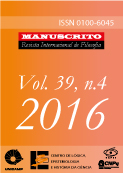Resumen
Certain views in the philosophy of time are described as ‘dynamic’. I borrow from Olson (2009: 3) in describing a ‘dynamic’ theory as one according to which: ‘certain times or events are absolutely present, and there is continual change in respect of which ones they are’. Dynamic views of time typically commit to the claim that “time passes”.Citas
MARKOSIAN, N. ‘How Fast Does Time Pass?’ Philosophy and Phenomenological Research, 53, 829-844, 1993.
MAUDLIN, T. The Metaphysics Within Physics, Oxford: OUP, 2007.
OLSON E. ‘The Rate of Time’s Passage’, Analysis, 69, 3-9, 2009.
PHILLIPS, I. ‘Rate abuse: a reply to Olson’, Analysis, 69, 503-5, 2009.
PRICE, H. Time’s Arrow and Archimedes’ Point, Oxford: OUP, 1996.
PHILLIPS, I. ‘The Flow of Time’, in Callender, C. ed. The Oxford Handbook of Philosophy of Time, Oxford: OUP, 276-311, 2011.
RAVEN, M. ‘Can time pass at the rate of 1 second per second?’, Australasian Journal of Philosophy, 459-65, 2010.
SHOEMAKER, S. ‘Time Without Change’, Journal of Philosophy, 66, 366-81, 1969.
SKOW, B. ‘On the Meaning of the Question ‘How Fast Does Time Pass?’’, Philosophical Studies, 155, 325-44, 2011.
TALLANT, J. ‘Ontological Cheats Might Just Prosper’, Analysis, 69, 422-30, 2009.
TALLANT, J. ‘Sketch of a Presentist Theory of Passage’, Erkenntnis, 73, 133-40, 2010.

